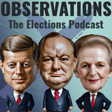
Democracy Under Threat? The Hidden Toll on Local Election Candidates
"Put your name up on Facebook with the name of your party—Reform UK—and suddenly you’re a jackbooty, brownshirt, swastika-wearing member of the Nazi party.”
That's what one contributor said to our research team for this year's local elections. As part of Democracy Volunteers election observation for the 2025 English local elections the team surveyed candidates of all parties to find out their experiences out campaigning and the threats, abuse and challenges they faced.
In this episode Jason McKenna interviews the Director of Democracy Volunteers, Dr John Ault, and report researcher, Matt Davis, to find out more about the report that was issued today. Entitled 'Threat to Candidates 2025' it shows the concerning rise of threats and violence towards local election candidates.
